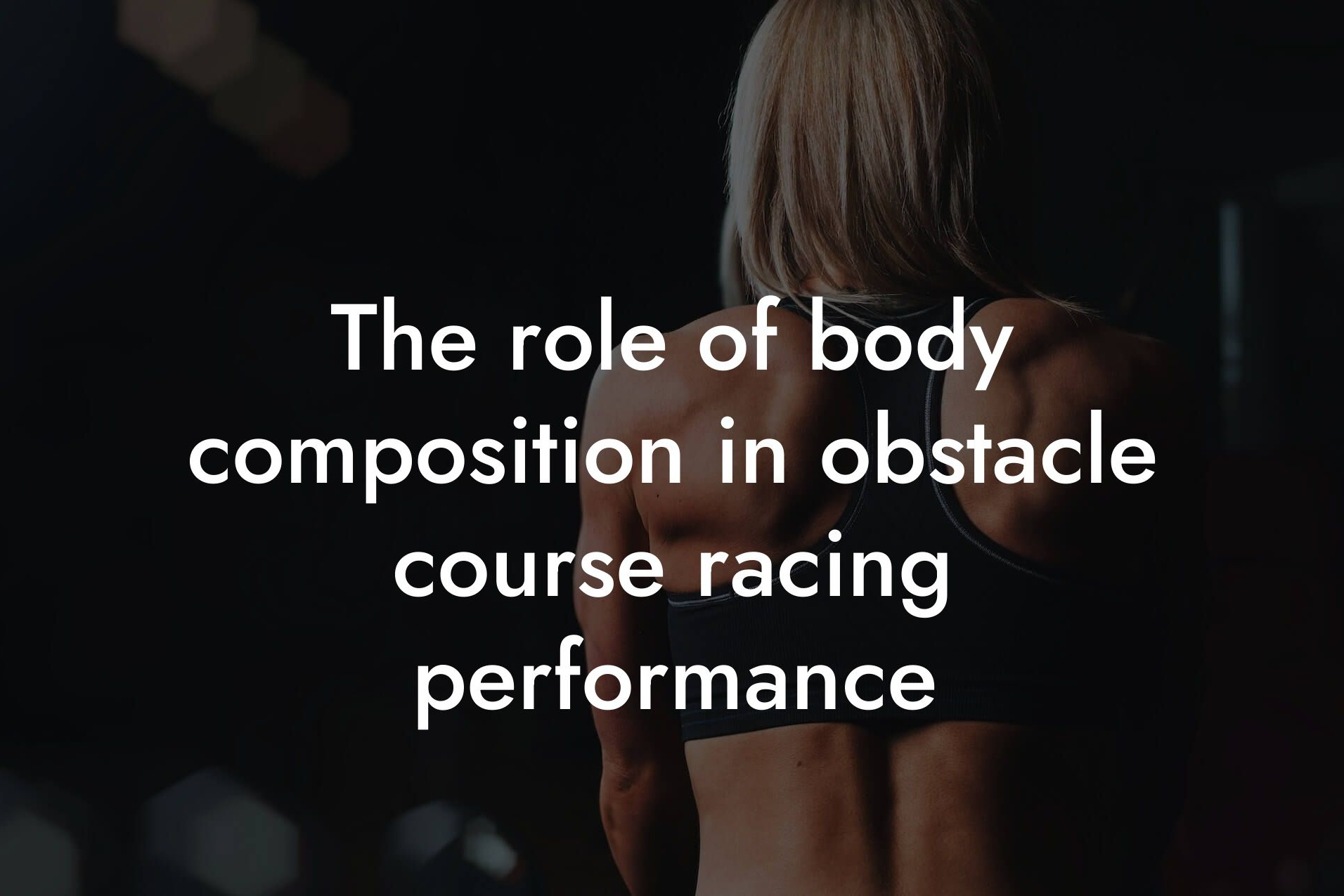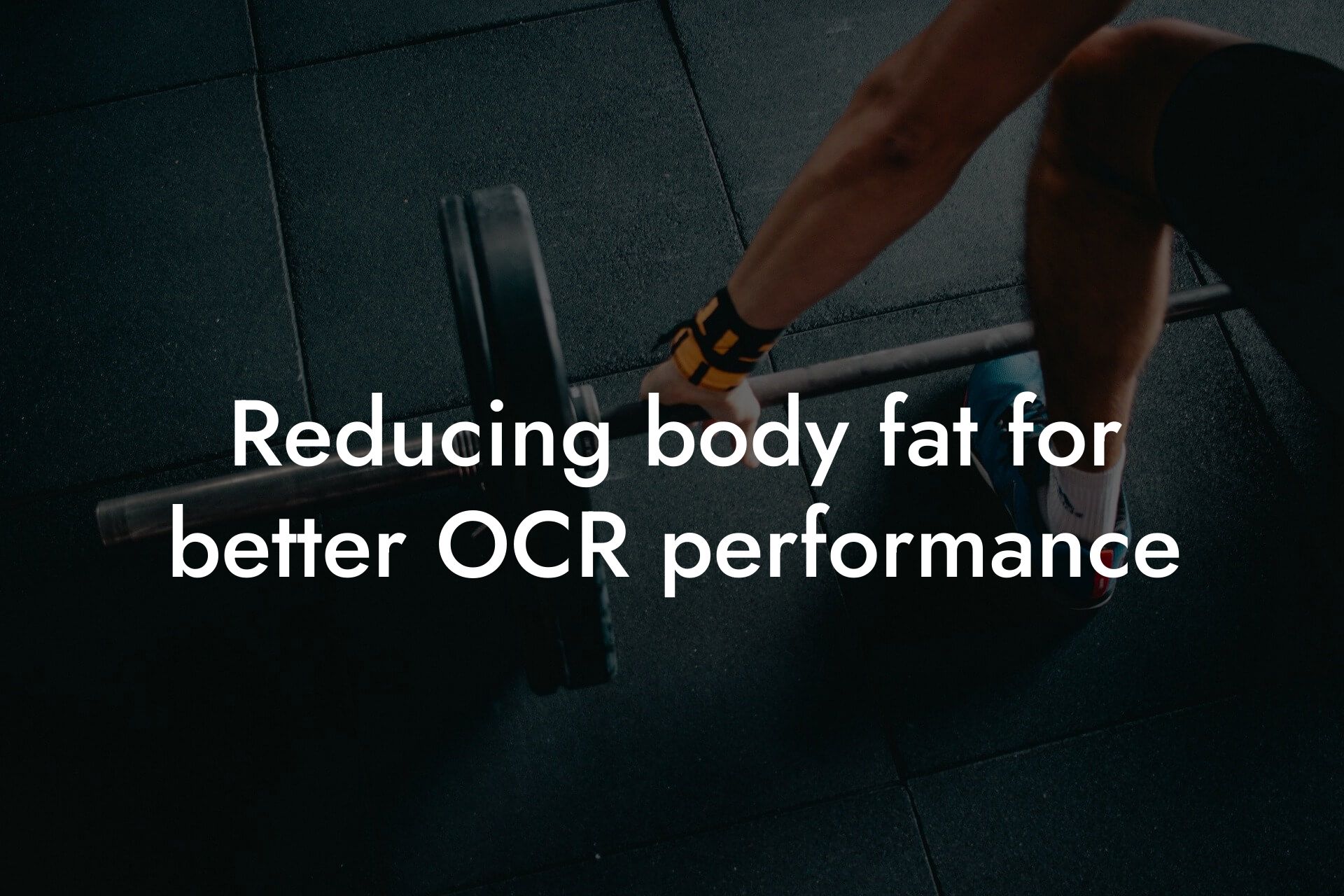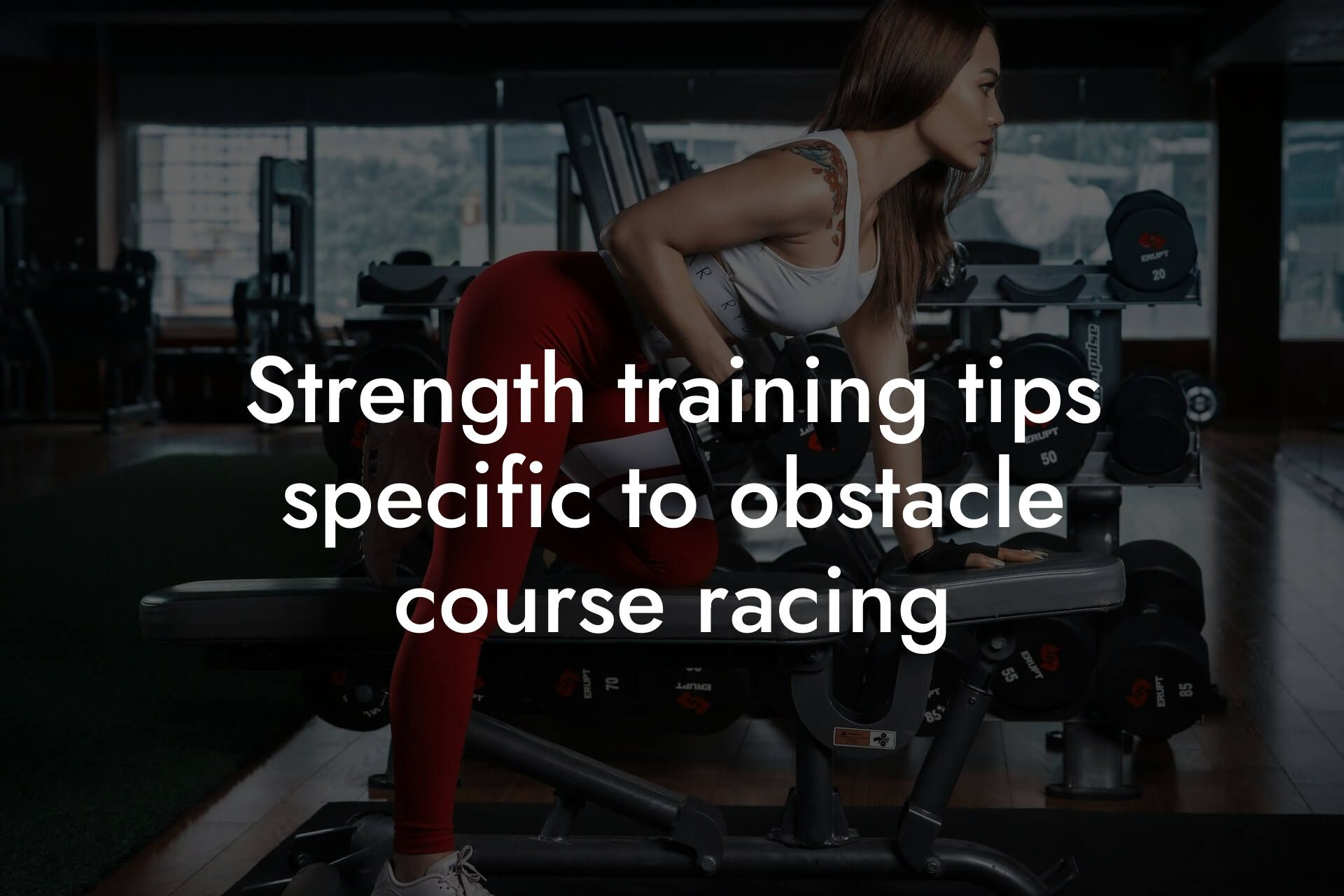As an obstacle course racing (OCR) athlete, you're likely no stranger to pushing your body to its limits. Whether you're tackling mud-soaked trails, scaling walls, or carrying heavy weights, OCR demands a unique combination of strength, endurance, and agility. However, there's another crucial factor that often flies under the radar: bone density. In this article, we'll delve into the importance of bone density in OCR performance, and why it's essential to prioritize bone health as part of your overall training regimen.
Table of Contents
What is Bone Density?
Bone density refers to the measure of how dense and strong your bones are. It's calculated by measuring the amount of minerals, such as calcium and phosphorus, within your bones. The higher your bone density, the stronger and more resilient your bones are to fractures and injuries. Peak bone density is typically reached in early adulthood, and from there, it can gradually decline with age, leading to conditions like osteoporosis.
Why is Bone Density Important for OCR Athletes?
OCR athletes are at a higher risk of bone-related injuries due to the high-impact nature of the sport. Repeatedly jumping, landing, and carrying heavy loads can put excessive stress on your bones, leading to fractures, stress fractures, and other musculoskeletal injuries. Stronger bones can help absorb these impacts, reducing the risk of injury and allowing you to perform at a higher level. Moreover, good bone density can also improve your overall athletic performance by enhancing your power, speed, and agility.
The Risks of Low Bone Density in OCR
Low bone density can have serious consequences for OCR athletes. Some of the risks associated with low bone density include:
- Increased risk of fractures and stress fractures, which can lead to prolonged periods of injury and downtime.
- Decreased athletic performance, as weakened bones can reduce your power, speed, and agility.
- Higher risk of osteoporosis, a condition characterized by brittle and porous bones.
- Increased risk of chronic pain and inflammation, which can impact your overall quality of life.
How to Improve Bone Density for OCR Performance
Fortunately, there are several ways to improve bone density and reduce the risks associated with low bone density. Some of the most effective strategies include:
- Resistance training: Engage in regular resistance exercises, such as weightlifting, bodyweight exercises, or resistance band exercises, to strengthen your muscles and bones.
- High-impact activities: Incorporate high-impact activities, such as jumping, running, or plyometric exercises, into your training regimen to stimulate bone growth and density.
- Proper nutrition: Ensure you're consuming a balanced diet rich in calcium, vitamin D, and other essential nutrients that support bone health.
- Adequate rest and recovery: Allow your body sufficient time to rest and recover between training sessions, as excessive fatigue can negatively impact bone density.
DEXA Scans: The Gold Standard for Bone Density Measurement
At Tano Performance Group, we understand the importance of accurate bone density measurement. That's why we use Dual-Energy X-ray Absorptiometry (DEXA) scans, the gold standard for bone density measurement. DEXA scans provide a comprehensive assessment of your bone density, allowing us to identify areas of improvement and develop personalized training programs to optimize your bone health.
How Tano Performance Group Can Help
At Tano Performance Group, we're dedicated to helping high-earning professionals like you achieve their physical goals and optimize their overall performance. Our comprehensive body assessment, which includes a DEXA scan, provides a detailed analysis of your body composition, bone density, and other key metrics. With this information, our team of experts can develop a personalized training program tailored to your specific needs and goals.
Bone density is a critical component of OCR performance, and neglecting it can have serious consequences for your athletic career and overall health. By prioritizing bone health, incorporating bone-strengthening exercises into your training regimen, and utilizing advanced technologies like DEXA scans, you can optimize your bone density and take your OCR performance to the next level. Remember, a strong body starts with strong bones – invest in your bone health today and reap the rewards for years to come.
Frequently Asked Questions
What is bone density, and why is it important for OCR performance?
Bone density refers to the measure of how dense and strong your bones are. It's a crucial aspect of overall health, especially for athletes participating in high-impact activities like Obstacle Course Racing (OCR). Adequate bone density helps prevent injuries, improves performance, and enhances overall physical fitness. As an OCR athlete, having strong bones can make a significant difference in your performance and reduce the risk of fractures and other bone-related injuries.
How does bone density affect OCR performance?
Bone density plays a vital role in OCR performance by providing a solid foundation for your muscles to work efficiently. When you have strong bones, you can generate more power, speed, and agility, which are essential for tackling obstacles and completing courses quickly. Additionally, good bone density helps absorb shock and distribute pressure more effectively, reducing the risk of injuries and allowing you to perform at a higher intensity.
What are the risks of low bone density for OCR athletes?
Low bone density can lead to an increased risk of fractures, stress fractures, and other bone-related injuries. This can result in prolonged recovery periods, missed training sessions, and decreased performance. Moreover, low bone density can also affect your overall health, increasing the risk of osteoporosis, osteopenia, and other bone-related disorders.
How can I improve my bone density for OCR performance?
Improving bone density requires a combination of proper nutrition, consistent training, and lifestyle changes. Focus on consuming a diet rich in calcium, vitamin D, and other essential nutrients. Engage in weight-bearing exercises, such as running, jumping, and strength training, to stimulate bone growth and density. Additionally, incorporate activities that challenge your balance and coordination, like yoga or Pilates, to improve overall bone health.
What role does nutrition play in maintaining good bone density?
Nutrition plays a critical role in maintaining good bone density. A diet rich in calcium, vitamin D, magnesium, and other essential minerals helps support bone health. Foods like dairy products, leafy greens, and fortified cereals are excellent sources of these nutrients. Additionally, adequate protein intake is necessary for building and repairing bone tissue. A well-balanced diet that meets your nutritional needs can help support optimal bone density.
Can I improve my bone density through supplements?
While supplements can be beneficial, they should not replace a balanced diet. Calcium and vitamin D supplements can help fill nutritional gaps, but it's essential to consult with a healthcare professional or registered dietitian to determine the appropriate dosage and type of supplement for your specific needs. Additionally, always choose high-quality supplements from reputable manufacturers to ensure safety and efficacy.
How does age affect bone density in OCR athletes?
As we age, our bone density naturally decreases. This process can be accelerated by factors like menopause, hormonal changes, and inadequate nutrition. OCR athletes over 30 should be particularly mindful of their bone density, as the risk of osteoporosis and fractures increases with age. Regular exercise, proper nutrition, and lifestyle changes can help mitigate this decline and maintain optimal bone density.
Can I improve my bone density if I'm already experiencing bone loss?
Yes, it's possible to improve bone density even if you're already experiencing bone loss. However, it's essential to work with a healthcare professional to develop a personalized plan that addresses your specific needs. This may involve a combination of nutrition counseling, exercise programming, and potentially, medication or supplements. With patience, consistency, and the right guidance, you can improve your bone density and reduce the risk of further bone loss.
How often should I get my bone density tested?
The frequency of bone density testing depends on your age, health status, and risk factors. Generally, OCR athletes over 30 should consider getting tested every 2-3 years. However, if you have a history of bone-related injuries or are experiencing symptoms like osteoporosis, you may need to get tested more frequently. Consult with your healthcare professional to determine the best testing schedule for your individual needs.
What are the best exercises for improving bone density in OCR athletes?
The best exercises for improving bone density in OCR athletes include weight-bearing activities like running, jumping, and strength training. These exercises stimulate bone growth and density by applying stress and pressure to the bones. Additionally, exercises that challenge balance and coordination, like yoga or Pilates, can help improve overall bone health. Aim to incorporate a mix of high-impact and low-impact exercises into your training program to support optimal bone density.
How does OCR training impact bone density?
OCR training can have both positive and negative effects on bone density. On the one hand, high-impact activities like running and jumping can stimulate bone growth and density. On the other hand, repetitive stress and overtraining can lead to bone loss and increased risk of fractures. It's essential to strike a balance between challenging your bones and allowing for adequate recovery and rest.
Can I improve my bone density through yoga or Pilates?
Yes, yoga and Pilates can be beneficial for improving bone density. These low-impact exercises can help improve balance, coordination, and overall bone health. Additionally, many yoga and Pilates exercises target the core and pelvic muscles, which are essential for maintaining good posture and reducing the risk of fractures. However, it's essential to combine these exercises with weight-bearing activities and other forms of exercise to support optimal bone density.
How does body composition affect bone density in OCR athletes?
Body composition plays a significant role in bone density. Having a healthy body fat percentage and adequate muscle mass can help support optimal bone density. Excess body fat can lead to increased inflammation and decreased bone density, while inadequate muscle mass can reduce the mechanical stress needed to stimulate bone growth. Focus on maintaining a healthy body composition through a balanced diet and regular exercise.
Can I improve my bone density if I have a history of bone-related injuries?
Yes, it's possible to improve bone density even if you have a history of bone-related injuries. However, it's essential to work with a healthcare professional to develop a personalized plan that addresses your specific needs. This may involve a combination of nutrition counseling, exercise programming, and potentially, physical therapy or rehabilitation. With patience, consistency, and the right guidance, you can improve your bone density and reduce the risk of further injuries.
How does hormone imbalance affect bone density in OCR athletes?
Hormone imbalance, particularly low testosterone or estrogen levels, can negatively impact bone density. Hormones play a crucial role in regulating bone metabolism, and imbalances can lead to decreased bone density and increased risk of fractures. OCR athletes experiencing hormone imbalances should work with a healthcare professional to address these issues and develop a plan to support optimal bone health.
Can I improve my bone density through stress reduction techniques?
Yes, stress reduction techniques like meditation, deep breathing, and yoga can help improve bone density. Chronic stress can lead to increased cortisol levels, which can negatively impact bone health. By reducing stress and promoting relaxation, you can create a more favorable environment for bone growth and density.
How does sleep affect bone density in OCR athletes?
Sleep plays a critical role in bone density. During sleep, your body repairs and rebuilds bone tissue, making it essential for optimal bone health. OCR athletes should aim for 7-9 hours of sleep per night to support bone density and overall physical recovery.
Can I improve my bone density if I'm a vegetarian or vegan?
Yes, it's possible to improve bone density on a vegetarian or vegan diet. However, it's essential to ensure you're consuming adequate amounts of calcium, vitamin D, and other essential nutrients. Plant-based sources of these nutrients include fortified cereals, dark leafy greens, and tofu. Consult with a registered dietitian or healthcare professional to develop a personalized nutrition plan that meets your needs.
How does menopause affect bone density in female OCR athletes?
Menopause can lead to a significant decline in bone density due to decreased estrogen levels. Female OCR athletes experiencing menopause should work with a healthcare professional to develop a plan that addresses this decline. This may involve hormone replacement therapy, nutrition counseling, and exercise programming to support optimal bone health.
Can I improve my bone density if I have a family history of osteoporosis?
Yes, it's possible to improve bone density even if you have a family history of osteoporosis. However, it's essential to take proactive steps to address your risk factors. Focus on maintaining a healthy lifestyle, including a balanced diet, regular exercise, and adequate sleep. Additionally, consult with a healthcare professional to develop a personalized plan that addresses your specific needs and risk factors.
How does smoking affect bone density in OCR athletes?
Smoking can negatively impact bone density by reducing blood flow to the bones and decreasing the absorption of essential nutrients. OCR athletes who smoke should quit as soon as possible to reduce the risk of bone-related injuries and support optimal bone health.
Can I improve my bone density if I have a sedentary job?
Yes, it's possible to improve bone density even if you have a sedentary job. Focus on incorporating regular exercise and physical activity into your daily routine, including weight-bearing activities and exercises that challenge your balance and coordination. Additionally, take regular breaks to stretch and move throughout the day to reduce the negative effects of prolonged sitting.
Here are some related articles you might love...
- The role of body composition in obstacle course racing performance
- Reducing body fat for better OCR performance
- Strength training tips specific to obstacle course racing
- Nutrition strategies for sustained energy during OCR events
- Preventing injuries in obstacle course racing: A comprehensive guide
- Improving agility and strength for obstacle course racing
- Balancing strength, speed, and endurance in OCR training
- Maintaining muscle recovery with OCR training
- Using DEXA scans to monitor progress in obstacle course training
Zak Faulkner
Zak Faulkner is a leading authority in the realm of physical health and body composition analysis, with over 15 years of experience helping professionals optimise their fitness and well-being. As one the experts behind Tano Performance Group, Zak has dedicated his career to providing in-depth, science-backed insights that empower clients to elevate their physical performance and overall health.
With extensive knowledge of DEXA technology, Zak specializes in delivering comprehensive body assessments that offer precise data on body fat, muscle mass, bone density, and overall physique. His expertise enables individuals to make informed decisions and achieve their fitness goals with accuracy and confidence. Zak’s approach is rooted in a deep understanding of human physiology, combined with a passion for helping clients unlock their full potential through personalised strategies.
Over the years, Zak has earned a reputation for his commitment to excellence, precision, and client-focused service. His guidance is trusted by top professionals who demand the best when it comes to their health. Whether advising on fitness programs, nutritional strategies, or long-term wellness plans, Zak Faulkner’s insights are a valuable resource for anyone serious about taking their health and fitness to the next level.
At Tano Performance Group, Zak continues to lead our Content Team revolutionising how professionals approach their physical health, offering unparalleled expertise that drives real results.




